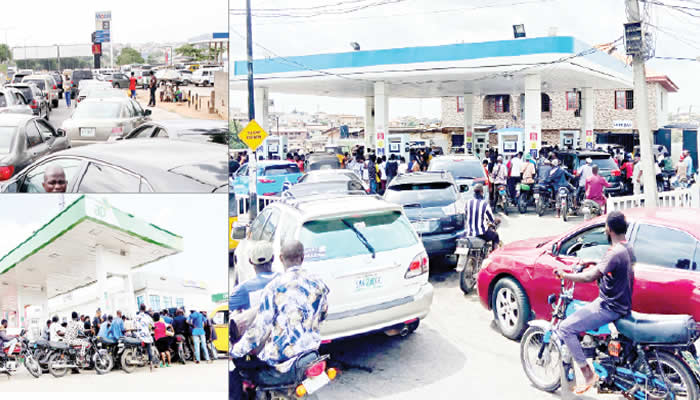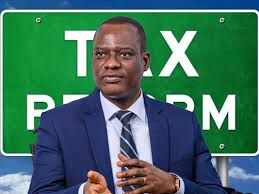Despite assurances from the Nigerian National Petroleum Corporation Limited (NNPCL) regarding logistic issues causing fuel scarcity, the situation remains dire for Nigerians, particularly in Lagos and other parts of the country.

Throughout the weekend, many filling stations remained closed, leaving citizens grappling with the scarcity of Premium Motor Spirit (PMS), commonly known as petrol.
Abuja Given Priority Over Other Regions
Reports indicate that the fuel crisis might escalate further in Lagos and other parts of the South-West, including Ogun, Oyo, and Osun, due to a directive issued by the NNPCL. This directive mandates that fuel trucks must prioritize servicing the Federal Capital Territory, Abuja, before attending to any other region. Consequently, a significant number of trucks departing from depots in Lagos since Friday have been directed towards Abuja.
Rationing and Reduced Supply
Officials from the NNPCL and marketers have revealed that there is a rationing system in place, with the NNPCL allocating only 5,000 metric tonnes of fuel to depots instead of the usual 10,000MT. This reduction in supply has led to concerns among industry insiders, who attribute it to the erratic nature of fuel imports by the national energy company.
Challenges in Importation
According to industry operators, the root cause of the erratic supply lies in the NNPCL’s challenges with fuel importation. Despite financial resources, the corporation sometimes faces disruptions in its supply chain, leading to issues like those experienced presently. These challenges highlight the vulnerability of Nigeria’s fuel supply system to external factors and logistical issues.
Impact on Regions and Consumers
The directive to prioritize fuel supply to Abuja has significant implications for regions like the South-West, where queues are expected to persist for the next few days. The government’s decision to prioritize the capital city underscores the importance placed on ensuring sufficient fuel availability in the seat of power.
Assurances Amidst Uncertainty
While the situation remains uncertain, officials like Hammed Fashola from the Independent Petroleum Marketers Association of Nigeria express hope that the queues in Lagos and Ogun will ease off in the coming days. However, concerns linger over the potential prolongation of the scarcity, especially in areas distant from fuel depots like Abuja.
NNPC’s Response
In response to claims of fuel rationing and prioritization of Abuja, NNPC spokesperson Olufemi Soneye refuted the allegations, labeling them as false. He emphasized the availability of fuel products and attributed the disruptions to temporary logistical challenges, which are expected to be resolved soon.
Nationwide Impact
The fuel scarcity is not limited to Lagos and its environs. Across states like Ogun, Ondo, Kwara, Osun, Ekiti, Sokoto, Kaduna, and beyond, long queues and rising prices characterize the fuel market. Consumers face heightened transportation costs and disruptions to daily activities due to the scarcity.
Challenges for Consumers
Consumers bear the brunt of the crisis as they contend with inflated fuel prices, long queues, and uncertainties regarding supply. The situation exacerbates existing economic hardships, with individuals and businesses feeling the strain of increased transportation costs and reduced productivity.
Hope Amidst Hardship
While the current fuel crisis presents significant challenges, there are signs of relief as oil dealers resume loading operations at key depots. Despite ongoing logistical hurdles, efforts are underway to address the supply chain disruptions and alleviate the plight of consumers across the country.
Read also:
- Nigerian Football Stars Shine Abroad: Hat-trick Hero Outshines Nwakali, Osimhen & Super Eagles Ace with 20 Goals
- Warning to Girls: Ladies Beware of False Pastors!
- Zubby Michael and Destiny Etiko Spark Relationship Rumours with Kiss: “Are You Two Dating?”
- Nigerian Man that sold Girlfriend for N5k shares her Response viral video
- Guinness World Record: Ghanaian Activist Breaks World Record by Hugging 1,123 Trees in One Hour
- Lagos seals five churches, 19 hotels over Noise pollution
- Bandits Kill Military Commander
- Nollywood Legend Ogunjimi Is Dead, Kunle Afod, Others Mourn: “We Tried Our Best”
- Xavi Decides to Remain Barcelona Coach, Confirmed by Club’s Vice-President
- New Record: Nigerian lady breaks Guinness World Record for longest interview
- Former Sex Worker in Dilemma as she finds out her Past Client is Brother-in-Law
- Zinoleesky blast Portable Following Diss Track Aimed at His Music Career
- Yahaya Bello: School writes EFCC to refund $760k fees paid for ex-Kogi gov’s children
- Nkechi Blessing shares experience with Odumeje as a true man of God
- Nasboi Brings Together Kanayo O. Kanayo, Speed Darlington, and Other Stars in a Hilarious Video to Support His New Song
- Painful Love Ends: How a Church Sermon Helped Me Breakup with My Abusive Boyfriend
- Lagos-Calabar Coastal Road Demolition to Commence This Saturday
- How to identify when a child is being bullied



